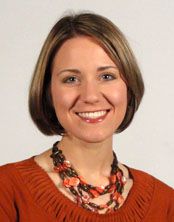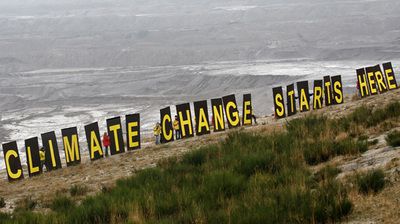There may be a good reason why TV weather forecasters are reluctant to talk about climate change. The minute they do, they risk alienating a large segment of the audience which may know as little about the science of climate change as they often do.
This week, researchers at the University of Texas and George Mason University released a study showing only 54% of weathercasters believe climate change is occurring, while one in four agreed with the assertion that climate change as a result of human activity is a scam (See the full research here).
“From our perspective there’s a lot of positive in it about the willingness of a lot of weathercasters who say they don’t know as much as they want to about the science,” Kris Wilson, senior lecturer in the College of Communication at the University of Texas told me this week. “They can still change their mind; they’re open to learning about the science.”
Wilson has created a two-hour module for weathercasters that tries to convince them that if they would simply report the science of climate change, the public might get better information.
“One of the big chunks was how do climate models differ from weather models, because many of the skeptics were couching their criticisms with ‘you can’t trust the models,'” according to Wilson. “If you can just stick to the science, the science is really pretty clear and definitive and the consensus that’s been built among climate change science is really very extraordinary in the field.”
Why does it matter what weathercasters say? Because for many people, it’s the only source of science information once they graduate from school. And TV newsroom managers are asking their weatherperson to take on some of the tasks of science reporting, a role 79% of the meteorologists surveyed say they welcome. Yet, only a third of TV weathercasters believe there is a scientific consensus on climate change.
But the method by which a TV newscast is put together, doesn’t help. “This winter is a perfect example because it was cold in, say, Washington DC.” Wilson says. “And so what happens is a producer will stack the blizzard in Washington right before the weathercast, and then sometimes the anchors will turn to them and say ‘Well, how can that be happening if global warming is going on?”
“Weathercasters refer to that as an ‘ambush,'” he says. “You don’t ever know what’s going to happen in that moment and sometimes what gets communicated is very off the cuff and spontaneous.”
And often, wrong.
It can be a scary moment in a profession where audience approval is required. WCCO meteorologist Mike Fairbourne found that out in 2008 when he signed a statement from 31,000 “scientists” who contended the role of humans in global warming is overblown. He was criticized by those who say the climate science couldn’t be more clear.
“Climate change, for unfortunate reasons, has become so politicized that you can’t even talk about science without setting yourself up from one side or the other. So weathercasters are trying to keep a low profile,” according to Wilson. “They also recognize the risk involved because it puts them out there. The most common questions they get involves a hesitancy to trust a weathercaster about a long-term forecast when they can’t get the short-term forecast right.”
That would certainly appear to be the case in Minnesota, where out of more than a dozen meteorologists I contacted for their view for this post, only two were willing or able to give it.
 “I feel tremendous pressure to take a side on global warming,” Steph Anderson, a meteorologist at KTTC TV in Rochester told me in an e-mail. “I’m a scientist, so people expect me to have a scientific viewpoint on it, and reasoning behind it. Turns out, I don’t like to talk about it.”
“I feel tremendous pressure to take a side on global warming,” Steph Anderson, a meteorologist at KTTC TV in Rochester told me in an e-mail. “I’m a scientist, so people expect me to have a scientific viewpoint on it, and reasoning behind it. Turns out, I don’t like to talk about it.”
“Honest and upfront, I don’t talk about it, I don’t believe in it. Mostly because I can’t say it’s happening, yet. It’s hard enough to get a seven-day forecast right; I’m supposed to believe that the earth is going to warm excessively in so many years? Climate has changed over the earth’s time. We’ve had ice ages and warmed back up. It’s cyclical. Who’s to say that won’t happen this time around? Weather’s hard enough to predict, but I don’t predict climate, I don’t work with models that do such things, but I know that in order for me to believe something, I need concrete data over a long period of time. Frankly, I haven’t seen that yet with the global climate change debate.
“I also won’t take a stance on global climate change when I’m presenting short-term data that’s all over the place. This last summer we had one of the coldest July’s on record. Now in March we haven’t had any snow. My seven-day forecast changes several times over the course of a week. I’m fighting enough for credibility. If I’m crying global warming and it’s not true…or if I’m not crying warming and it is true…I’d rather not risk my credibility at something that’s so long-term and far out I can’t predict it….and is hard to predict anyway.”
Kris Wilson says the tendency of weathercasters to relate climate change to meteorology — rather than climatology — is the source of viewer/listener misinformation. “They have distinct differences and what we’re finding is that they’re projecting a lot of inconsistencies and flaws of weather forecasting models onto climate forecasting models. The weather is much more volatile. But climate models don’t work that way.”
Heidi Cullen, a meteorologist who once suggested meteorologists should not be certified by the American Meteorological Society “if they can’t speak to the fundamental science of climate change,” told the New York Times this week that the climatologists aren’t stepping on the weather forecasters’ turf. “They are not trying to predict the weather for 2050, just generally that it will be hotter,” she said. “And just like I can predict August will be warmer than January, I can predict that.”
Craig Edwards, an MPR meteorologist and long-time National Weather Service meteorologist, says the political nature of the debate clouds the need for stewardship. “In the book by Newt Gingrich and Terry Maple, A Contract with the Earth, they state there is no “we vs. they” when it comes to the stewardship of the planet. As a meteorologist, if I predict rain for Friday and it doesn’t rain, you can track me down on Saturday and tell me I was wrong. As a climatologist, if I predict that 100 years from now that the ocean level will rise 20 inches and it only comes up five inches, I won’t be around for you to tell me I was wrong. If we have 100 years to prepare for coastal sea level to rise two feet, yet we continue to build oceanside, shame on us.”
“Do I feel as if we should be doing everything we can to reduce our energy consumption, drive more fuel-efficient cars, and be more earth-friendly?” Anderson adds. “Absolutely, but we should have made this effort long ago, not because of global warming fears, and at least before Al Gore’s film came out. To me, his film has turned global warming into more of a political game than a science one. Also, I don’t feel the average citizen is very informed of climate change and is rather brainwashed. So when they hear a piece of data, such as, “this year the earth warmed 1 degree”, I feel their mindset goes like a magnet to a fridge to “global warming!”. But what caused that 1 degree warm-up? Was it really humans? Was it something else?”
Steph Anderson says she prefers to “leave the long-term stuff up to the experts.” The experts — climatologists — say the problem is they don’t get the chance to spend five minutes a night before a trusting television audience.
Learn more about the research from Kris Wilson of the University of Texas.()

